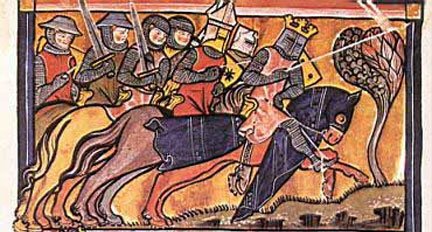
Charlemagne's power was also based on violence
Charlemagne waged numerous wars. His battles with the Saxons were particularly long and fierce. In this campaign, lasting more than thirty years, his aim was not only to subjugate his enemies but also to convert them to Christianity. Their conversion was sometimes brutally forced upon them.
According to the Franconian annals, in 782 at Verden Charlemagne ordered the execution of 4,500 Saxons who had been delivered into his hands by allied Saxon leaders. It is to this "Massacre of Verden" that later depictions of Charlemagne as a "Saxon slayer" refer. Among historians there is much debate about whether Charlemagne's act of vengeance was really on the scale described. But it is a fact that, even in his own times, contemporaries like Charlemagne's own close friend Alcuin criticised the harshness of his measures or objected to the forced baptisms. Charlemagne's father Pippin had also resorted to similar methods to subjugate his enemies, the Alemanni.
After their subjugation, Charlemagne gradually integrated the Saxons into his empire. Saxon nobles rose to high positions, and the traditional law and lore of the Saxons was recorded and chronicled.
Illumination from a world chronicle, circa 1300
St. Gallen
Charlemagne the Cruel
(from Einhard, The Life of Charlemagne, written circa 840)


